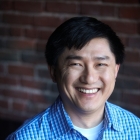The film was produced by San Francisco Public Defender Jeff Adachi and also screened at the recent San Francisco International Asian American Film Festival. The documentary features a series of interviews with Asian American actors and directors along with clips depicting Asian American men, both good and bad images.
Same old story, really. Most of the time Hollywood will only cast Asian Americans -- male and female -- in stereotypical roles: the dork, the whore, the kung fu master, the gangster or someone who speaks with an accent.
One thing The Slanted Screen brought out that I didn't know much about was that Sessue Hayakawa was one of the top leading men during the silent film era. Somehow he was able to overcome the racism of the day and be a big star and romantic lead.
The conclusion or solution that The Slanted Screen leaves viewers with is that it's going to take time, and that more Asian Americans have to join the ranks of writers, producers, directors and Hollywood executives in order for things to change in any meaningful way.
I understand the argument that maybe some people spend too much time worrying about issues that The Slanted Screen brings up. Sure, things like immigration, education and poverty are seemingly more important. I think they all have synergy with each other, so you can't ignore one for the other. The images that are put out by Hollywood are engrained into society, and that in turn affects how Asian Americans are viewed when it comes to the "big" issues like immigration or politics.
At the very least, The Slanted Screen makes you want to applaud the actors, writers and directors who are trying to make it. It's good to see that they are still plugging away, despite all the obstacles, and that they still have hope that things are changing, however slowly.







Comments